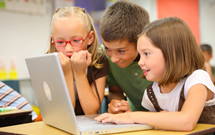
Advancements in digital media are helping young children use technology to develop important social and emotional skills as they enter school, and a new PBS Kids resource aims to give children the resources they need to improve those skills.
Social and emotional skills form a large part of a child’s learning foundation, and children are not going to be successful with academic content if they aren’t able to do self-regulatory things such as focus on a task, get along with others, and sit still, said Roberta Schomburg, an early childhood education expert and associate dean and director of Carlow University’s School of Education.
Preschool teachers spend much time helping children develop those self-regulating skills, and families can engage children in out-of-school activities to help them develop those skills, which also include problem-solving, self-confidence, and risk-taking.
To that end, PBS Kids recently launched Daniel Tiger’s Neighborhood, a new television series, mobile app, and robust website that builds on the classic PBS series Mister Rogers’ Neighborhood.
See also:
New study shows early learning helps prevent crime
Schomburg said the free resources—television show, website, and app—help children understand and manage their feelings, because young children often can be confused by feelings and can struggle to identify which exact feeling they are experiencing. The website features games, videos, and printables.
Each episode of Daniel Tiger’s Neighborhood consists of two engaging stories that center on a common early learning theme, such as dealing with disappointment. The series uses musical strategies to reinforce each theme. Every story includes an “imagination moment” in which Daniel plays out a preschool fantasy set to music. Then, the day’s strategy is reprised in a full song at the end.
“We’re really in a whole new place since tablets have come on the market, and the touch screen is more prevalent,” Schomburg said. “Young children often have trouble with the concept of a mouse. The tablets are so intuitive.”
And many parents hope they are able to help their children develop these crucial social and emotional skills as they enter early education programs.
An August 2012 PBS Kids survey of 1,008 mothers of children ages 2-6 revealed that 67 percent of respondents said they provide childcare at home for their youngest child. Half use professional childcare through a preschool program, professional daycare, or at-home daycare.
Parents said they believe their children receive more guidance on the skills their children will need for kindergarten from their parents at home, instead of from professional daycare. Eighty-six percent of parents said they have a lot of influence in preparing their children for kindergarten, and 59 percent said their children’s preschool teachers have a lot of influence.
Parents spend a different amount of time teaching different skill sets. They spend “a lot of time” teaching their children to follow directions (59 percent), count to 10 (57 percent), share (54 percent), and ABCs (53 percent). The survey revealed that parents are less likely to teach their children how to work independently (44 percent) and solve problems (40 percent).
See also:
New study shows early learning helps prevent crime
Many parents said they feel they don’t spend enough time preparing their kids for kindergarten, but said they generally feel that they spend more time than professional caregivers.
Only about half of parents (54 percent) said they feel very confident in their ability to support their child in math, 62 percent said they feel confident supporting their children in literacy, and 61 percent said they feel confident supporting their children in social and emotional preparedness. Roughly one in five parents said they feel they do not have the tools needed to prepare their children’s social/emotional skills for entry into kindergarten.
Forty percent of parents use reading, 39 percent use counting, and 33 percent use ABCs as the primary activities to teach their children. Nine percent said they use educational TV shows and videos.
When shown a list of sources that teach children’s social and emotional skills, parents cited parenting books and magazines (47 percent), PBS Kids (46 percent), online parenting sites (46 percent), and other moms or parents (45 percent).
- Friday 5: Virtual field trips - April 26, 2024
- Google, MIT RAISE launch no-cost AI training course for teachers - April 26, 2024
- 4 ways to support work-based learning - April 23, 2024

Comments are closed.